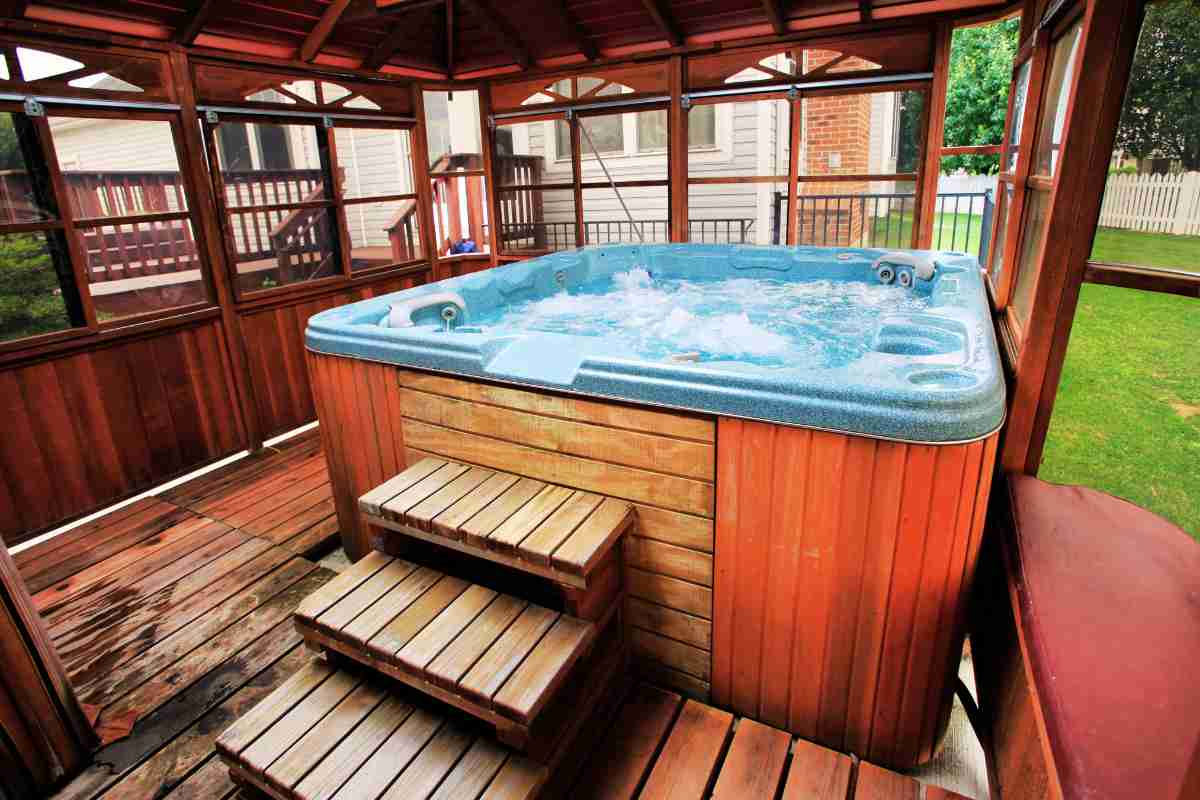Discover the Top Health Benefits of Hot Tubs
Discover the health benefits of hot tubs: relieve pain, improve sleep, and boost well-being with relaxing heated water and massaging jets.

Hot tubs have been symbols of luxury for ages, but their value extends far beyond simple relaxation. A regular hot tub soak can be a powerful tool for improving your overall health. From easing chronic pain to promoting better sleep, the benefits of hot tubs are both numerous and backed by science.
If you're looking for a way to enhance your physical and mental well-being, adding a hot tub experience to your routine might be the answer. The heated water and massaging jets work together to create a therapeutic environment.
The Top 10 Benefits of Hot Tubs
Soaking in warm water in a hot tub or spa pool is more than just a pleasant pastime. It's a form of hydrotherapy that can have profound effects on your body and mind. Here are ten of the most significant hot tub benefits you can expect.
1. Stress Relief and Relaxation
In our demanding daily lives, managing mental stress is essential for long-term health. A hot tub provides a sanctuary where you can unwind and let go of tension. The combination of warm water, buoyancy, and water massage from the tub jets helps soothe the nervous system.
This deep relaxation helps lower levels of cortisol, the body's primary stress hormone. Regular use can contribute to improved mental health and overall mental well-being. It offers a dedicated space to disconnect from devices and social media, allowing your mind to truly rest.
2. Improved Sleep Quality
If you struggle to get a full night's rest, a pre-bedtime tub soak might be the solution. Soaking in heated water raises your core body temperature. After you get out, the subsequent cooling period signals to your brain that it's time to sleep.
This natural temperature shift can help you fall asleep more quickly and experience a deeper, more restorative sleep cycle. This improvement in sleep quality can have a cascading positive effect on your energy levels, mood, and cognitive function the next day. A good night's sleep is foundational to good health.
3. Pain Relief for Sore Muscles and Joints
One of the most celebrated hot tub benefits is pain relief. The buoyancy from water immersion reduces the effect of gravity on your joints, giving them a much-needed break. This is especially beneficial for people with chronic conditions that cause joint pain.
The heat increases blood flow to sore areas, helping ease discomfort in tense muscles and accelerating recovery after exercise. This form of hydrotherapy can also improve flexibility and range of motion. For anyone dealing with persistent aches, a hot tub can be a comforting and effective part of a pain management plan.
4. Better Cardiovascular Health
A regular hot tub session can be a surprising ally for your heart health. The warm water causes your blood vessels to expand, which can lower your blood pressure. This process also makes your heart beat faster, providing a light workout for your cardiovascular system.
While it doesn't replace exercise, this passive aerobic effect can complement an active lifestyle and help reduce the risk of cardiovascular disease. Some research suggests that regular thermal therapy can improve outcomes for individuals with certain heart conditions. It's a relaxing way to support your heart.
5. Improved Circulation
The heat from a hot tub is excellent for promoting healthy circulation. As your body temperature rises, your blood vessels dilate, allowing improved blood flow throughout your body. This enhanced circulation delivers more oxygen and nutrients to your cells.
Better circulation can speed up healing, reduce inflammation, and even contribute to healthier-looking skin. This full-body benefit helps your systems function more efficiently. It's a simple way to give your circulatory system a boost while you relax.
6. Arthritis Symptom Relief
For individuals living with arthritis, a hot tub can offer significant relief from daily discomfort. The combination of warmth and buoyancy is particularly effective for conditions like rheumatoid arthritis. The water supports your weight, taking pressure off inflamed joints.
The heat helps to reduce stiffness and increase blood flow to the joints, which can decrease pain and improve mobility. Many people with arthritis find that regular soaks allow them to perform daily activities with greater ease. This makes a hot tub a valuable tool for managing symptoms and improving quality of life.
7. Enhanced Skin Care
While the old idea of "sweating out toxins" is a myth, a hot tub can still benefit your skin. The warm water and steam can help open up your pores, allowing for a deeper clean. Increased blood flow from the heat also delivers more oxygen and nutrients to your skin cells, promoting a healthy glow.
However, this benefit is tied to a properly maintained tub. Keeping your tub clean is critical to avoid any potential skin infection. With the right care, a hot tub can be a great addition to your skin care routine.
8. Headache Relief
Tension headaches, often caused by tight muscles in the neck and shoulders, can be debilitating. The massaging action of hot tub jets can directly target these tense muscles. As the muscles relax, the tension that causes the headache often dissipates.
The overall relaxing effect of a hot tub soak can also help alleviate headaches triggered by stress. By reducing muscular and mental stress simultaneously, a hot tub can be an effective, non-pharmaceutical way to manage certain types of headaches. It's a soothing remedy at the end of a long day.
9. Improved Insulin Sensitivity
Emerging research has pointed to an interesting connection between heat therapy and blood sugar management. Some studies suggest that regular hot tub sessions can help improve insulin sensitivity. This could be particularly beneficial for individuals managing or at risk for type 2 diabetes.
The effect has been compared to that of a brisk minute walk, as it can help the body use insulin more effectively to regulate blood sugar. While it is not a substitute for medication or lifestyle changes, it could be a supportive therapy. This potential benefit shows how a hot tub can contribute to managing certain chronic conditions.
10. Social and Relationship Benefits
A hot tub isn't just a solo retreat; it's a wonderful social hub. It provides a relaxing, screen-free environment for connecting with family and friends. The warm water and calm atmosphere encourage open conversation and quality time together.
For couples, a shared tub experience can be a romantic way to reconnect and unwind. Strengthening social bonds is a key component of mental well-being. A hot tub offers the perfect setting to nurture those important relationships.
The table below summarizes some key benefits and how they can help with specific goals or health conditions.
Making the Most of Your Hot Tub Experience
To fully enjoy the benefits hot tubs include, it's important to use them correctly. Proper use ensures both safety and maximum therapeutic effect. A few simple guidelines can elevate your tub session from a simple soak to a true wellness ritual.
Following best practices will also help you maintain your equipment, ensuring your investment lasts for years to come. Here are some tips for an optimal hot tub experience.
- Keep the water temperature between 100-104°F (38-40°C) for adults.
- Limit your soaking time to 15-30 minutes per session to avoid overheating.
- Stay hydrated by drinking plenty of water before, during, and after your soak.
- Ensure your hot tub is properly maintained with balanced chemicals to keep the water safe and clean.
- Use a quality spa cover to keep debris out and maintain water temperature efficiently.
- Consider adding aromatherapy oils for an enhanced relaxation experience.
- Consult your doctor before starting a hot tub regimen if you have pre-existing health concerns.
Who Should Avoid Hot Tubs?
While a tub session offers many advantages, it isn't suitable for everyone. Certain health conditions can be worsened by the heat and water immersion. It is crucial to be aware of these risks to avoid hot tubs if you fall into a high-risk category.
Your health and safety should always be the top priority. If you have any doubts, speaking with a healthcare professional is the best course of action. They can provide personalized advice based on your medical history.
- People who are pregnant, especially during the first trimester, should avoid hot water as it can raise core body temperature.
- Individuals with known heart disease or uncontrolled high blood pressure should consult a doctor first.
- Those with open sores, wounds, or a skin infection should not use a hot tub to prevent worsening the condition.
- People with kidney disease may need to be cautious due to potential changes in blood pressure and fluid balance.
- If you are taking medications that cause drowsiness or affect your heart rate, a hot tub soak may be unsafe.
Choosing the Right Hot Tub or Swim Spa
If you're ready to invest in your health, choosing the right hot tub or swim spa is the next step. Consider your specific needs, the available space, and your budget. Swim spas offer the dual benefit of a hot tub and a space for low-impact aquatic exercise.
Think about how many people will use it regularly to determine the right size. Pay attention to the placement and quality of the hot tub jets, as they provide the therapeutic water massage. A well-designed jet system can target specific muscle groups for better pain relief.
Also, look for energy-efficient models with good insulation and a well-fitting swim spa cover. This will help manage ongoing operational costs. A properly maintained unit will provide health relaxing benefits for years to come.
You can also check out the range of Spas and Swim Spas at SpaWorld.
The benefits of hot tubs and spa pools are extensive, touching nearly every aspect of physical and mental health. From stress relief and improved sleep to better cardiovascular health and pain management, a hot tub is much more than a luxury item. It is a powerful wellness tool that can be integrated into your daily life.
By helping ease the symptoms of many chronic conditions, promoting relaxation, and providing a space for social connection, a hot tub can significantly enhance your quality of life. The consistent use of heated water for therapy is a practice that supports longevity and vitality. Investing in a hot tub experience is an investment in a healthier, more balanced you.




Comments ()